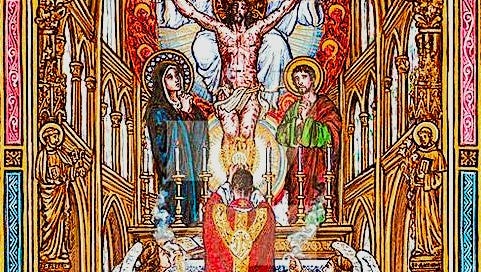Meditation for the Third Monday after Pentecost, June 30, 2025: Holy Mass an Homage of Respect
Excerpt from the book Meditations for all the Days of the Year
Holy Mass an Homage of Respect
Preparation
The worship of latria1 which we render to God by the Holy Sacrifice, and to which we ought to associate ourselves, does not consist only in the supreme esteem of God, but also in a profound reverence for His greatness. We shall see today:
How Christ in the Blessed Sacrament testifies His reverence towards His Father.
How in our habitual conduct we ought to be reverential towards God.
We will then make the resolutions:
Always to speak to God in our prayers with profound reverence, accompanied with perfect modesty of demeanor.
In all places to have great reverence for the presence of God, whose eyes are upon us day and night.
Our spiritual nosegay shall be the words of the Psalmist: “I will worship towards Thy temple in Thy fear.” (Psalm 5:8)
Let us adore God as being eminently worthy of the reverence of all creatures; and, in our powerlessness to reverence Him as He merits to be, let us offer Him all the reverence which Jesus Christ renders Him in heaven and upon our altars; “By Jesus Christ, as Jesus Christ, and in union with Jesus Christ, glory and honor to Thee, God the Father.”
First Point
Jesus in the Holy Sacrifice Teaches us, by His Example, Reverence for God.
Isaias admired in the future Messiah, by means of the prophetic light, the spirit of reverential fear of God (Isaias 15:32); and, according to St. Paul, it is this profound reverence for the Divinity which gives to all His prayers their value and their efficacy (Hebrews 5:73). He manifested it in the Garden of Olives by abasing Himself, in the presence of the majesty of His Father, to such a degree that He prostrated Himself with His face to the ground; He manifested it at the praetorium and on Calvary, by offering Himself there as our Victim to the greater glory of God, and He does not cease to manifest it in the highest heaven, where, as our Pontiff, He continually offers His adorable Victim, which is Himself.
But it is, above all, in the Holy Sacrifice that this great and supreme reverence shows itself. There, in order to honor the infinite excellence of the Divine Being, Jesus, our High-Priest, falls down in adoration, and seems to desire to annihilate Himself by hiding Himself, with all His glory, under the symbols of death, under a little host or particle of a host by depriving Himself of the use of all His senses, and by immolating Himself mysteriously, although in an unbloody manner: He, no longer the Son of man in a state of infirmity and resemblance to the flesh of sin, but the Eternal Son of God, reigning in His glory, the Divine Pontiff, holy, separate from sinners and raised above the heavens.
Now, these extreme abasements, so incomprehensible in so great a Pontiff, in the very equal of God, eloquently tell us of the profound reverence with which He is penetrated towards the Divine Majesty, and with which He desires to inspire us. Let us pray to God to penetrate us with these lofty mysteries.
Second Point
How, in our Habitual Conduct, we ought to be Reverential towards God.
Our duty as Christians is to associate ourselves with the perfect reverence and the profound abasement of Jesus Christ in the presence of God, our heavenly Father. Like Him, we ought to annihilate ourselves, through the feeling of our baseness in the presence of God, of our unworthiness compared with His sanctity. The Church in heaven gives us the example of it, for the angels praise Him, the dominations adore Him, the powers reverence Him with trembling, and the seraphim, covering themselves with their wings, dare not look upon so lofty a majesty (Preface of the Mass).
The Church on earth does the same; for it is a constant fact that the more the saints excel in virtue, the more filled are they with reverence and with a kind of fear when they enter the house of God; the more, also, are they led to annihilate themselves in presence of the Divine Majesty, and to show their reverence for His presence in all places by a modest deportment, by a becoming language, by an irreproachable life; the more careful are they to look upon God always as God; that is to say, with perfect reverence, even if it be only in regard to the shortest prayer, or to a sign of the cross; the more reverence have they, lastly, for what belongs to God and to His worship, to the persons who are consecrated to Him, to the sacred vessels, to objects blessed by the Church, to ceremonies, to the Holy Scriptures, which St. Charles always read kneeling down and with head bare.
Let us examine ourselves as to whether we have the profound reverence felt by the saints, the respect they manifested in the house of God and in prayer; their veneration for all that appertains to divine worship.
Meditations for All the Days of the Year, Vol. 3 by Reverend M. Hamon, S. S. (Benzinger Brothers, 1894, pages 283-286).
Supreme worship allowed to God alone. See more at the Catholic Encyclopedia.
“In their streets they are girded with sackcloth: on the tops of their houses, and in their streets all shall howl and come down weeping.” — Isaias 15:3
“Who in the days of his flesh, with a strong cry and tears, offering up prayers and supplications to him that was able to save him from death, was heard for his reverence.” — Hebrews 5:7



